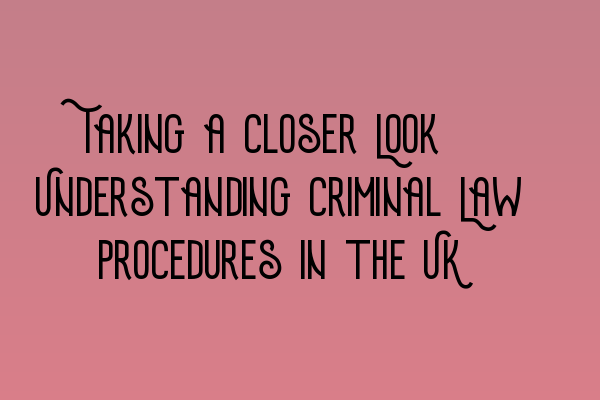Taking a Closer Look: Understanding Criminal Law Procedures in the UK
When it comes to criminal law in the UK, understanding the legal procedures is crucial for both legal professionals and the general public. The criminal justice system ensures that crimes are appropriately addressed, offenders are held accountable, and justice is served. In this article, we will delve into the key aspects of criminal law procedures in the UK, helping you develop a clearer understanding of how the system works.
1. Investigation and Arrest
Every criminal case starts with an investigation. Law enforcement agencies, such as the police, gather evidence, interview witnesses, and collect relevant data to establish the facts. If there is enough evidence to suspect that an individual has committed a crime, an arrest may be made. The arrested person is then taken into custody, where their rights are protected, and they have the opportunity to seek legal advice.
2. Charging
Once the arrest has been made, the Crown Prosecution Service (CPS) comes into play. The CPS is responsible for reviewing the evidence gathered by the police and making a decision on whether to charge the suspect. The decision is based on whether there is a realistic prospect of conviction and whether it is in the public interest to proceed with the case.
3. Bail and Remand
After being charged, the suspect may be released on bail, which means they are allowed to go free until their trial. However, bail may be subject to certain conditions, such as surrendering their passport or reporting regularly to the police. In some cases, where the suspect is deemed a flight risk or a danger to society, they may be remanded in custody until the trial takes place.
4. Plea and Case Management Hearing
Once the suspect has been charged, a Plea and Case Management Hearing (PCMH) is scheduled. During this hearing, the defendant is required to enter a plea of either guilty or not guilty. If the defendant pleads guilty, the case proceeds to sentencing. If the defendant pleads not guilty, a trial date is set.
5. Trial
The trial is the heart of the criminal justice process. It is where the prosecution presents the evidence against the defendant, and the defendant has the opportunity to challenge the evidence and present their own defense. Trials can take place in either the Magistrates’ Court or the Crown Court, depending on the severity of the offense.
6. Sentencing
If the defendant is found guilty or pleads guilty, they will proceed to the sentencing phase. A judge assesses the circumstances of the case and determines the appropriate punishment, taking into account factors such as the severity of the crime, the defendant’s previous convictions, and any mitigating circumstances. Sentences can range from fines and community service to imprisonment.
Understanding criminal law procedures in the UK is essential for all individuals involved in the legal system, including solicitors, barristers, and law enforcement officers. For aspiring lawyers seeking to qualify, it is crucial to have a comprehensive understanding of criminal law practices. To prepare for the SQE exams, check out our comprehensive SQE 1 Practice Exam Questions and SQE 1 Practice Mocks FLK1 FLK2 articles.
To excel in criminal law, it is important to stay updated with the latest legal developments and hone your expertise through continuous learning. Our SQE 2 Preparation Courses and SQE 1 Preparation Courses can provide you with the knowledge and skills required to succeed in the legal profession.
Stay informed about important dates related to the SRA SQE exams by referring to our comprehensive article on SRA SQE Exam Dates.
In conclusion, criminal law procedures in the UK involve a series of steps, from investigation and arrest to trial and sentencing. Each stage is designed to protect the rights of the accused and ensure a fair and just outcome. By understanding these procedures, legal professionals can navigate the criminal justice system with confidence and integrity.
Sources:
– SQE 1 Practice Exam Questions
– SQE 1 Practice Mocks FLK1 FLK2
– SQE 2 Preparation Courses
– SQE 1 Preparation Courses
– SRA SQE Exam Dates
